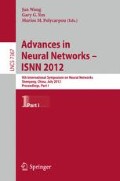Abstract
A novel class of recurrent neural network (RNN), termed Zhang neural network (ZNN), has been proposed for solving online time-varying problems by Zhang et al since 2001. In this paper, by defining different Zhang functions (ZFs), we construct different ZNN models correspondingly solving for time-varying Moore-Penrose inverse (MPI). As an error-monitoring function, ZF is the basis of the ZNN design method and can be positive, zero, negative, bounded or even unbounded (including lower-unbounded). Computer simulation results further illustrate the excellent convergence performance of the proposed ZNN models for online time-varying MPI solving.
Access this chapter
Tax calculation will be finalised at checkout
Purchases are for personal use only
Preview
Unable to display preview. Download preview PDF.
References
Fieguth, P.W., Menemenlis, D., Fukumori, I.: Mapping and pseudoinverse algorithms for ocean data assimilation. IEEE Trans. Geosci. Remote Sensing 4, 43–51 (2003)
Park, J., Choi, Y., Chung, W.K., Youm, Y.: Multiple tasks kinematics using weighted pseudo-inverse for kinematically redundant manipulators. In: Proc. 2001 IEEE Conference on Robotics & Automation, Seoul, Korea, pp. 4041–4047 (2001)
Hu, J., Qian, S., Ding, Y.: Improved pseudoinverse algorithm and its application in controlling acoustic field generated by phased array. J. Syst. Simul. 22, 1111–1116 (2010)
Staroswiecki, M.: Fault tolerant control: the pseudo-inverse method revisited. In: Proc. 16th IFAC World Congress, Prague, Czech Republic (2005)
Guo, P., Lyu, M.R.: A pseudoinverse learning algorithm for feedforward neural networks with stacked generalization applications to software reliability growth data. Neurocomputing 56, 101–121 (2004)
Song, J., Yam, Y.: Complex recurrent neural network for computing the inverse and pseudo-inverse of the complex matrix. Appl. Math. Comput 93, 195–205 (1998)
Zhang, Y., Yang, Y., Tan, N., Cai, B.: Zhang neural network solving for time-varying full-rank matrix Moore-Penrose inverse. Computing 92, 97–121 (2011)
Getz, N.H., Marsden, J.E.: Dynamical methods for polar decomposition and inversion of matrices. Linear Alg. Appl. 258, 311–343 (1997)
Author information
Authors and Affiliations
Editor information
Editors and Affiliations
Rights and permissions
Copyright information
© 2012 Springer-Verlag Berlin Heidelberg
About this paper
Cite this paper
Zhang, Y., Xie, Y., Tan, H. (2012). Time-Varying Moore-Penrose Inverse Solving Shows Different Zhang Functions Leading to Different ZNN Models. In: Wang, J., Yen, G.G., Polycarpou, M.M. (eds) Advances in Neural Networks – ISNN 2012. ISNN 2012. Lecture Notes in Computer Science, vol 7367. Springer, Berlin, Heidelberg. https://doi.org/10.1007/978-3-642-31346-2_12
Download citation
DOI: https://doi.org/10.1007/978-3-642-31346-2_12
Publisher Name: Springer, Berlin, Heidelberg
Print ISBN: 978-3-642-31345-5
Online ISBN: 978-3-642-31346-2
eBook Packages: Computer ScienceComputer Science (R0)

